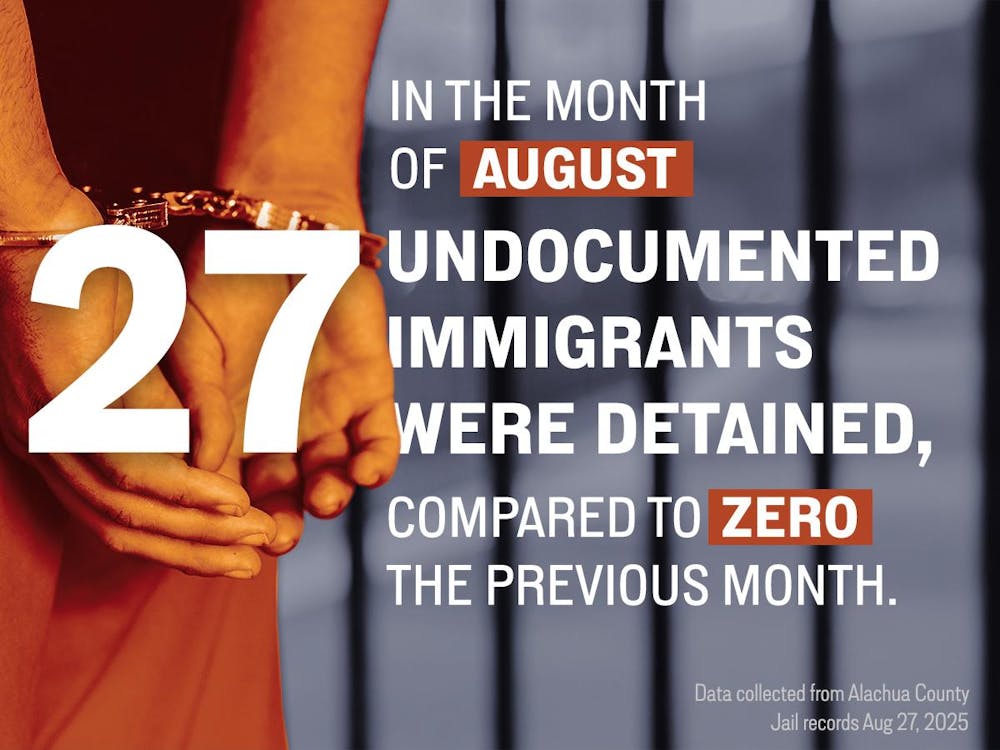Arrests made by Immigration and Customs Enforcement agents in Alachua County have increased in recent weeks, jail records show.
ICE has arrested 27 people in the county this month as of Aug. 27, with 24 of those arrests occurring over the past two weeks. The highest single-day total for arrests occurred Aug. 25, when six people were detained in Alachua County Jail. By contrast, there were no ICE arrests in the entire month of July.
The surge occurred amid a weeklong, statewide operation that led to 1,120 immigrant arrests throughout Florida — the largest number in a single state in ICE’s history, according to a press release.
Records show several people arrested share last names and were arrested the same day. County officials, however, have not yet confirmed relationships or specific countries of origin.
Records identify about half of those arrested as Hispanic, and a large majority, about 87%, as male. Ages range from 19 at the youngest to 57 at the oldest, with a median age of 33. All have the Florida Highway Patrol listed as the arresting agency, rather than the county sheriff’s department.
The Alachua County Sheriff’s Office declined to identify the federal agents involved. The office emphasized the arrests were conducted by ICE agents, not local deputies.
“This increase in the number of people arrested is not related to us, but to ICE and the federal government,” said Capt. Chris Sims, a sheriff’s office spokesperson, in a statement.
The jail cooperates with ICE under federal authority, Sims said. Florida leads the nation in the number of 287(g) agreements, which allow ICE to delegate certain enforcement powers to local law enforcement.
“Yes, we have to do it. We don’t have a choice,” Sims said, adding that deputies must report encounters with immigrants without legal status to ICE.
Ramírez Solórzano, a UF Latin American studies professor, said the increase is part of a broader political strategy across the South. Programs such as 287(g), he said, have strengthened cooperation between ICE and local authorities in Florida.
The impact of these policies, Solórzano said, is growing distrust among immigrants toward government institutions. Fear has become an essential tool of public policy, he said, normalizing discrimination and the persecution of immigrants.
“There is no trust anymore,” Solorzano said. “When something happens in your community, you won’t go to the police because you’re afraid the police will report you, because you’re afraid the police might also be acting as immigration agents. And now, who are we supposed to trust?”
That fear is shaping daily life for some Gainesville residents. Maia Canessa, an 18-year-old UF industrial engineering freshman and international student, said local immigrants are even avoiding basic routines.
“Many won’t leave their homes, not even to go to work or take their children to school” due to the paranoia of being detained, she said.
“They don’t want to be the next ones arrested,” Canessa said.
Alligator staff contributed to this report.
Contact Sofia Alamo at salamo@alligator.org. Follow her on X @alamosofiaa.

Sofia Alamo is a Sports Journalism freshman at UF and the university’s Women’s Tennis beat reporter. Her favorite sports are soccer and tennis, and she aspires to be a sports broadcaster in the future.






